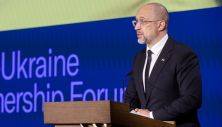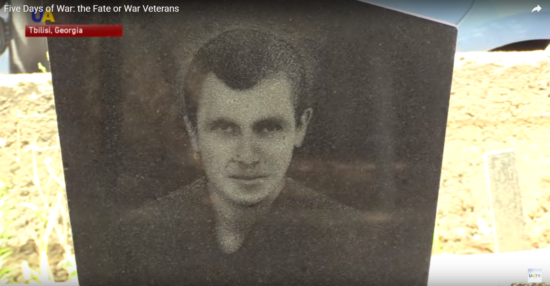In this special report, the fourth in our series on the 2008 Russo-Georgian war, our correspondent met with some of the men who fought.
Maka Kakhniashvili planted a rose bush on the grave of her brother. She brought it from their hometown, Tskhinvali. Kakhniashvili was only 12 years old when her older brother, Nukzari Kakhniashvili, died in Abkhazia. He was injured in the assault on Sukhumi and taken prisoner, where he was brutally tortured. His veins were cut and his face disfigured. Nukzari Kakhniashvili was 23 years old.
“Coming to terms with this was the hardest part…”Maka Kakhniashvili said.
Her mother was also killed during the bombing in Tskhinvali, ten years ago.
“She was always calming me down, saying i should not come, because everything was fine. In the evening of Aug. 8, she stopped answering phone calls. Getting to the city was impossible, since it had been bombed. I had to walk there. I did not find my mother in the hospital, so I returned to Tbilisi to look for her among the people who were evacuated. The woman who was in the car with her said that my mother was dead,” Maka Kakhniashvili stated.
242 civilians and 162 servicemen were killed over the five days of Russia’s invasion in Tskhinvali region.
“Many people wonder why Georgians fight on the Ukrainian side. We have one common enemy, and we are in the same situation as you are,” said Dodo Gugeshashvili, retired colonel of the Armed Forces of Georgia.
Gugeshashvili fought in four wars against Russia. She retired as a colonel of the Georgian army. Now, she is a combat instructor for Ukrainian war volunteers. She recalls that during the war in Abkhazia, it was clear that Russia would not stop.
“Ukrainians helped us a lot in Abkhazia. They were saying that if we didn’t stop the Russian military on the Gumista river, then we would have to stop their advance on the Dnipro river in Ukraine. And now, when Ukrainians are at war, I know that they are defending my Georgia as well. I know for certain that we will all meet someday in Sukhumi, Crimea, Gagra, Tskhinvali, Donbas, liberated from Russia,” Gugeshashvili said.
At one of the biggest military cemeteries in Tbilisi, the graves of the soldiers are looked after by their brothers in arms. Eighty-three servicemen who died in Abkhazia while defending Georgia are buried there. Ukrainian soldier, Mykola Obertinsky, is among them.
“He came to Georgia. He came to the Guard department and said that he was a tanker, and he wanted to help Georgians fight against Russian invaders. On July 1, Russian and North Caucasian mercenaries began the attack. In one of the battles, Mykola drew the fire on himself and ordered others to withdraw. Those who were there later talked about seeing how the clothes were ripped from his body by the bullets. We have an Easter tradition to put our red dyed eggs on the graves. Mykolas grave is completely covered in red,” said Malakia Chanuvadze, the head of the Veteran Solidarity Fund.
Chanukvadze says that in Georgia there are more than 50 thousand veterans. To help them and their families, he founded a solidarity fund. It provides medicine and sends children to summer camps. They plan to raise money to build a veteran house for those who are in a difficult situation. Veterans pay a lot of attention to relatives of the deceased, especially to the parents who lost their children in the war.
“Their parents still think about others. If you need help, they will rush to help, as if it is their children still living. They call all of us their sons, and we treat them like they are our parents,” Chanuvadze stated.













